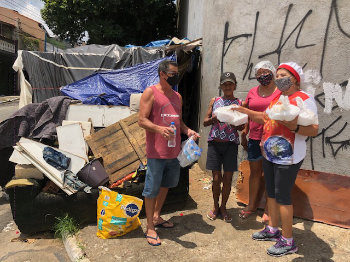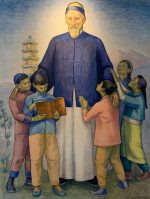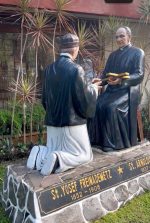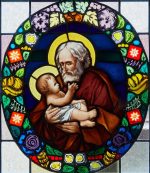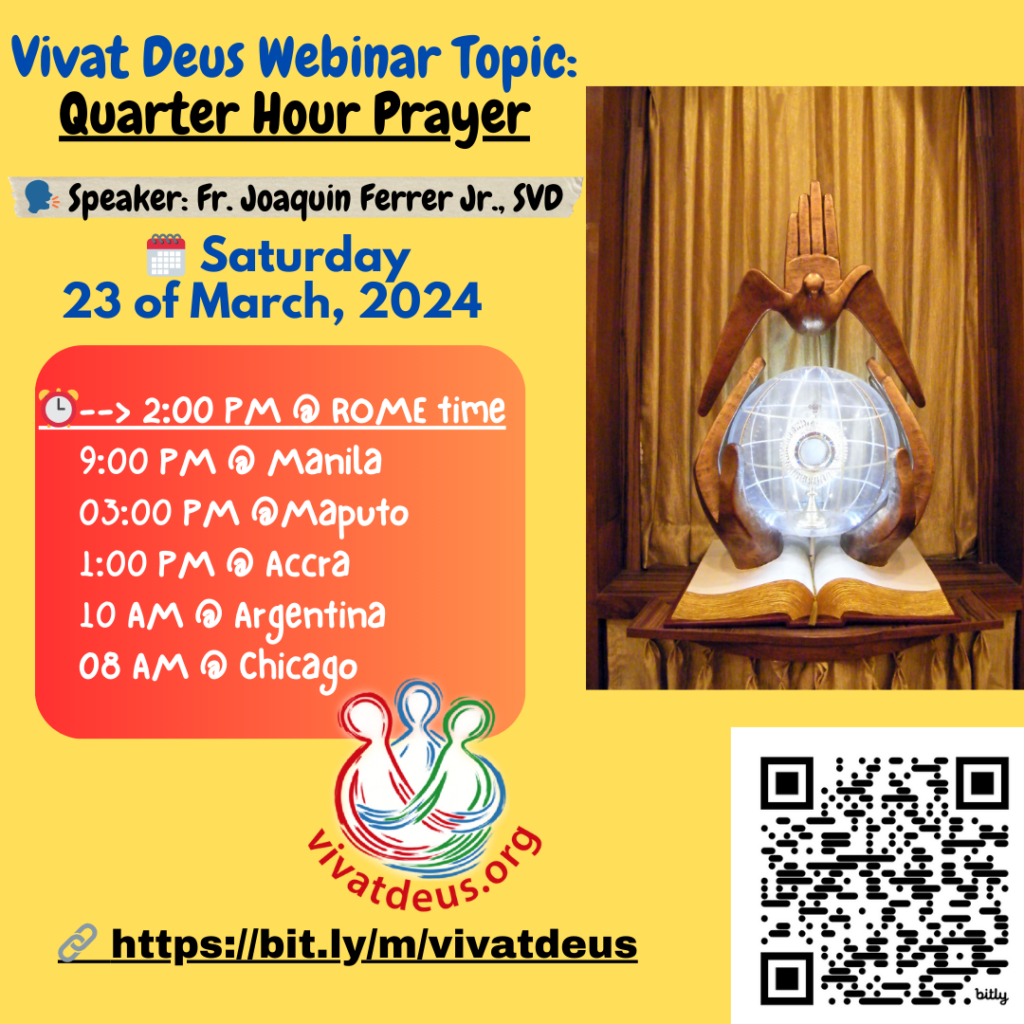In this year 2021 we will celebrate Lent and Easter in a world that mourns the death of more than two and a half million people from covid-19. In Brazil, the country where I live, that figure has already risen to more than 264,325 thousand people (03/07/2021).
Something similar is repeated in practically all the countries of the world, to a greater or lesser extent. In the United States, the world’s richest and most powerful nation, the death toll has already surpassed the terrifying figure of half a million fatalities. The damage in the economic, political, social (and religious!) Fields, we will see its devastating effects in the coming months and years.
But, we can ask ourselves if with this pandemic the same thing that happened with the two world wars, the Spanish flu and the Holocaust of the Jews will not happen, which together cost humanity around 30 times more deaths than this crisis of the new coronavirus until this moment. As missionary congregations, we must not forget that this tragedy has heightened awareness that things cannot remain as before. Something new needs to happen in the world order and in the relationship between people and human groups.
Pope Francis has insisted on this issue through forceful pronouncements, eloquent symbolic gestures and concrete directions. It is increasingly essential to build a more just, supportive and fraternal world order.
It is in the midst of such a situation that this year we celebrate the time of penance, fasting and prayer and of return to the Word of God with which the Church inaugurates the liturgical season that prepares us for the feast of the Resurrection of the Lord. We, as sons and daughters of Arnold Janssen, have an obligation to ask ourselves if the forty days of Lent have something different and new to say to us. I think it has. Especially in the field of our spirituality and missionary action.
*****
We know that our Generalates are already concerned with rethinking the changes, priorities and emphasis that are necessary after the control of the pandemic and the return to a more routine missionary-pastoral life. Everything seems to indicate that it is about building a “new normal” – or, in biblical language, a “new conversion” – that reinforces in our congregations the hope and eschatological certainty that the Kingdom of God is already closer to us. (Lk 1, 15).
Most of the current members of our Congregations were born in Asia, Africa and Latin America. Hence the great diversity of faces, minds and hearts that characterize us today. This is an aspect that even tends to grow in the next decade, so that our religious families, although fragile in the face of the enormous challenges that await us, can play a valuable role in the construction of a “new normal”.
For this and other reasons, I see Lent this year as “an appropiate time” for us to accept what the Holy Spirit is saying to the churches (Rev.1,9 – 3, 22) and to reflect from the heart on it. The role that we have to play as members of a Church committed to the vocation of always being, in Christ and through Christ, life and light for all peoples (LG 1).
As a guide for Lenten reflection, nothing is more appropriate than listening to the biblical texts that we will be reading at Masses during the forty days in which the entire Church prepares for a mayor conversion with the Resurrection of the Lord.
I briefly recall some of these texts, remembering that the pandemic was something that we find difficult to admit: we are extremely fragile, we are sinners, life passes quickly, the rest are ashes and dust. This is the reality that the pandemic has once again opened to those with eyes to see and ears to hear. Let us reread and meditate personally and in community what the Old and New Testament prophets say:
Joel, 12, 2, – 18; Deut. 30, 115-20; Is. 38, 3; Is 58-1-14;
Is, 42, 1-7; Is.49; 1-7; Is 50, 4-9; Is 55, 10-11; 53, 13-15;
Mt 6, 1-15; Jonah 3, 1-10, Mt 7, 7-12; Ez 18, 21-28.
Lc 5, 27-32; Lc 9, 22-25; Mk 1, 12-15.
Reading these texts can raise in many of us the same question that I have been asking myself more than once in recent months: will the calamities caused by Sars-CoV-2 also require from our congregations a more concrete revision and practice of their missionary priorities, their lifestyles and their missionary spirituality?
*****
As a missionary priest, I participated intensely in many different changes inside and outside the Church. I have always considered these vicissitudes of life and history as “temptations” of the Spirit (Lk 4, 1-2) that can lead us to have clearer conscience of what God asks of us. Saint Ignatius of Loyola taught that it is necessary to learn to discern everything that happens and see what the Spirit is trying to tell us. He called this exercise in spiritual struggle and enlightenment a”discerning of spirits.”
I believe that the pandemic will not change everything because the factors at play are more important than the current “plague”. However, it can be a precious opportunity for the Church in a penitential attitude to examine its conscience on the role it plays in the current historical situation. When I say Church, I am referring especially to our missionary congregations that are present in 85 countries on five continents.
I can explain this better looking at what happened recently in Brazil in the midst of the pandemic crisis. The federal government found that about five million people did not even have documents (birth certificate, identity card, work card) that would allow them to prove their existence as citizens, so they were entitled to a monthly allowance of three hundred to six hundred real (local currency).
That would help them at least not starve during the prolonged pandemic. For federal tax computers, they were simply “invisible.” I have the impression that even for some religious congregations that came to Brazil about a hundred years ago, this cantidad of people was and to some extent (also today) remains invisible.
As a theology student in Germany, I attended a lecture by the theology professor Klaus Hemmerle (later Bishop of Aachen / Germany) on the subject of the spirituality of Fr. Arnold Janssen. I had already taken classes on the subject with Fr. Alberto Rohner, a man of great knowledge of the subject. Even today I remember what was said by A. Hemmerle. According to him, although our Founder was not a theologian, he knew how to give our Congregations a very solid theological foundation, placing at the center of our spirituality central points for all Christian theology from the invocation with which he headed the titles of his letters, and that he made us pray every quarter of an hour: “Long live the Triune God in our hearts and in the hearts of all.” The same occurs with the action of the Holy Spirit as a bond of love between the Father and the Son and his daily action in the Church and in history (the gifts); the Incarnation of the Word as a human being in everything like us, except in sin; the urgency of announcing the Word of God (salvation) to all peoples; that of the primacy of mission and holiness in the life of the Church; the importance and beauty of the liturgy in the life of the community, the devotion to the Blessed Sacrament, etc. Together with him, as I recall the daily prayer book that we used in my novice days (the old “Vademecum”), it reflected much of the piety that prevailed in the Rhineland, the region of Germany where Saint Arnold was born.
In the first fifty years after the death of the Founder, this was the religiosity that remained in the spiritual heritage that he left us. Only after the Second Vatican Council was there a reform, a real turn, rather, in our ecclesiological, christological and missiological conceptions (“missio Dei”) which, of course, also influenced our style of living, working and praying.
*****
Also the piety, asceticism and the pastoral-missionary zeal that reigned in the Missionary House of Steyl and that needs to be seen in the context of the Church, Culture and Society in which our congregations were founded. The first and second generations of SVD´s and the Little Sisters and Servants (of Blessed Helena Stollenwerk and Hendrina Stenmanns and Adolfina Stönnies) left the legacy of Saint Arnold almost intact.
I give as proof of this the personal experience of the Tyrolean priest Fr. José Freinademetz, one of the few candidates who arrived as a priest at the missionary house and soon left for China. In a letter he wrote on August 20, 1878, about his first impression of Arnold’s spirituality and his first followers: I still have a word about the house I am in now. This is truly a house where you can breathe the spirit of piety and fear of God. I say this with all sincerity of how little I could see in these two days of my stay here. I am not afraid to say too much if I say that I have never encountered anything similar in Cassianeo or in the Seminary of Bressanone.
In a second letter (dated October 29, 1878) he thus confirms his first impressions: I am very happy to be in this house and it will never be too much to thank God for the grace that he has given me as a sinner. Don’t expect me to change my mind unless God wants me to. On the contrary, pray and ask yourselves every day for the grace that our family has a missionary among them.
*****
It was only after Vatican II that, led by our then Superior General John Schütte, we assumed “in toto” the broad reform that the Church in Lumen Gentium, Dei Verbum, Ad Gentes, Gaudium et Spes, Unitatis Reintegratio, in Perfectae Caritatis and other Constitutions and Conciliar Decrees also proposed to the Congregations of consecrated and missionary life.
*****
The General Chapters that we had after the Council were very creative according to two criteria that I think are the main ones: that of fidelity to our religious-missionary charism and the awareness that a reform was necessary to be able to have an evangelical dialogue with the modern world. From then on, we began to define more clearly the spiritual profile of our missionary congregations.
Personally, as far as spirituality is concerned, I remember the reflection that was made in the 70s, as a member of the first commission for the drafting of the new Constitutions of the Congregation of the Divine Word, impressed me a lot. I remember the joy I felt when we approved, not without many objections and discussions, Constitution number 112, 1-4, inspired by the spirit of the Assembly of Medellín / Colombia (1968) in which the Bishops of Latin America did a rereading of the documents of Vatican II. Some members of the commission wanted this text, at most, to be part of the Directory, because in their opinion it was an important directive, but of short duration, which did not correspond to what the Constitutions of a Religious Congregation should be. For me, however, this Constitution is at the root of what ten years later we call a quadruple prophetic dialogue. Today I think that this characterizes and makes more certain what I am as the son of Saint Arnold Janssen: “missionary disciple”. For this reason, I also felt very happy when I learned that the V Assembly of Bishops of Latin America had chosen as the motto of its meeting in Aparecida / Brazil (2007): “Disciples and Missionaries of Jesus Christ so that our peoples may have more life.” Later I learned that the president of the Commission that wrote the text of Aparecida had been the then Archbishop of Buenos Aires / Argentina, today Pope Francis. I have the impression that he, as Pedro’s successor, is very aware of what was said in Aparecida.
The term disciple (“mathetes”) appears in the New Testament more than two hundred and forty times. It refers mainly to the twelve whom Jesus called to be with him and send them out to preach. (Mk 3, 13-15). It also refers to the 72 that he sent to the places where he himself would pass. According to the evangelist Lucas, they returned happy with what they had experienced on their first mission.
A moment of intimacy and prayer was created between Jesus and them, in which Jesus, exulting in joy in the Holy Spirit, thanked the Father for “having hidden these things from the wise and intellectual and revealed to the little ones” (Lk 10 , 21).
The grace that our congregations must implore the One and Triune God, in this Lent of 2021, they become true missionary disciples of Jesus Christ so that all the nations of the world have life.
———-
Edênio Reis Valle, SVD is a psychologist. He was provincial of the BRC Province, vice-rector of the Pontifical Catholic University of S. Paulo, president of the National Conference of Religious of Brazil, Coordinator of the PANAM Zone, advisor to the NCBB (National Conference of Bishops of Brazil) and founder of ITA (Acolher Therapeutic Institute). He currently resides in the José Freinademetz Community, in São Paulo.
